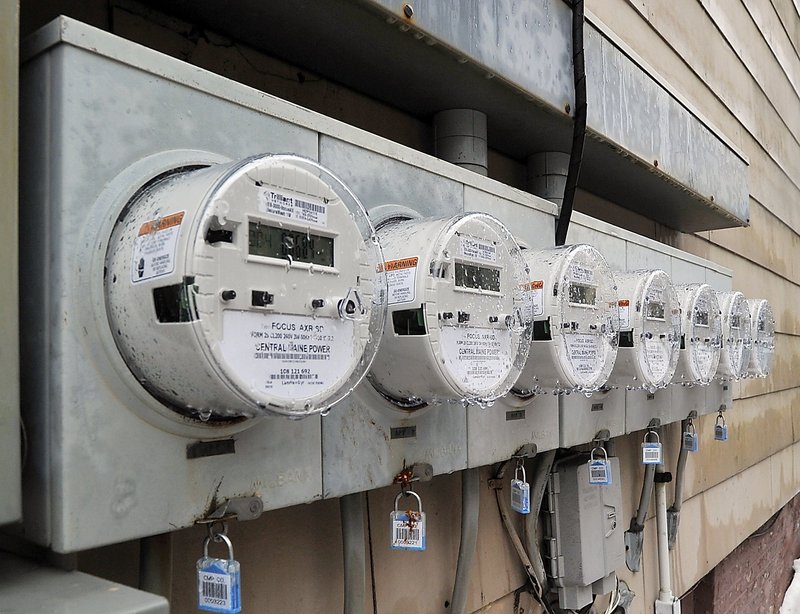Attorneys for the Maine Public Utilities Commission and opponents of utility “smart meters” will return to Maine’s highest court Tuesday in the latest round of debate over the wireless technology’s safety.
The Maine Coalition to Stop Smart Meters is appealing a 2014 review by the PUC that concluded the radio-frequency waves from more than 600,000 meters installed by Central Maine Power pose no health threat to the public. Maine’s Supreme Judicial Court will hear oral arguments Tuesday morning, revisiting a review the court itself ordered in 2012 after determining that the commission had not met its legal obligation to ensure the meters were safe before approving CMP’s $200 million conversion program.
The case, although focused solely on utility meters, is part of a broader debate over whether the low-energy radiation emitted by cellphones, wireless computing networks and countless other electronic devices could cause cancer or other health issues. While the World Health Organization’s International Agency of Research on Cancer has labeled radio-frequency waves as “possibly carcinogenic to humans,” the WHO also states that no adverse health effects have been established to date. And efforts to more strictly regulate such wave-emitting devices in Maine and nationally have failed to gain traction.
In March 2014, PUC staff produced a 67-page report stating that they found no credible, peer-reviewed studies showing a direct health risk from smart meters and that evidence presented during the review was inconclusive. Two of the three commissioners agreed with the finding in September 2014 with the third member recusing himself because of past work he conducted for CMP.
Gail Rice, spokeswoman for CMP, pointed out that the radio-frequency waves emitted by the utility’s smart meters are well below the standards established by the Federal Communications Commission. Smart meters transmit data on electricity usage and other information to the utility electronically, eliminating the need for human meter readers.
“What we have said in the past from the program’s beginning in 2010 is we have been very confident that the meters and the other devices pose no threat to health or safety,” Rice said.
Ed Friedman and other members of the Maine Coalition to Stop Smart Meters disagree, however, and have waged a years-long campaign first to stop the meter installations and since to rollback or change the program. Friedman, who is the lead complainant in the Supreme Court case, and other critics claim smart meters can cause headaches, fatigue, loss of sleep and potentially cancer.
In its court appeal, the coalition argues that a PUC decision can be overturned by the courts if found “unreasonable, unjust or unlawful in light of the record.” They say both the PUC and the utility did not meet the burden of proof to prove that smart meters are safe.
“We have certainly more than established doubts that these things are safe,” Friedman said Monday. “And the burden was on them, not us, to prove they’re safe.”
CMP customers can opt-out of the smart meter program and continue having their meter read by a person but at a cost of $12 a month. Coalition members argue that the monthly fee is too high for some Mainers to afford and that customers shouldn’t have to pay extra to protect their health.
PUC spokesman Harry Lanphear said the commission’s in-house legal team will argue their case to the Law Court.
“We feel confident in our position and in the decision the commission has made,” Lanphear said. “We feel they will be looked favorably upon by the court as well.”
The number of customers opting out of the smart meter program has declined from a high of 8,622 customers in June 2012 to roughly 7,100 as of September 2015, according to CMP. Rice said that in addition to helping customers track their electricity usage more closely, the more than 600,000 smart meters have helped the utility flag and respond to outages more efficiently while avoiding 2 million of miles driven by employees.
But Friedman said Maine and other states need to act in the absence of action at the federal level.
“I have no faith at all that anything good will come out of the FCC (Federal Communications Commission) on this,” Friedman said. “Meanwhile, the states can regulate this.”
Send questions/comments to the editors.




Success. Please wait for the page to reload. If the page does not reload within 5 seconds, please refresh the page.
Enter your email and password to access comments.
Hi, to comment on stories you must . This profile is in addition to your subscription and website login.
Already have a commenting profile? .
Invalid username/password.
Please check your email to confirm and complete your registration.
Only subscribers are eligible to post comments. Please subscribe or login first for digital access. Here’s why.
Use the form below to reset your password. When you've submitted your account email, we will send an email with a reset code.